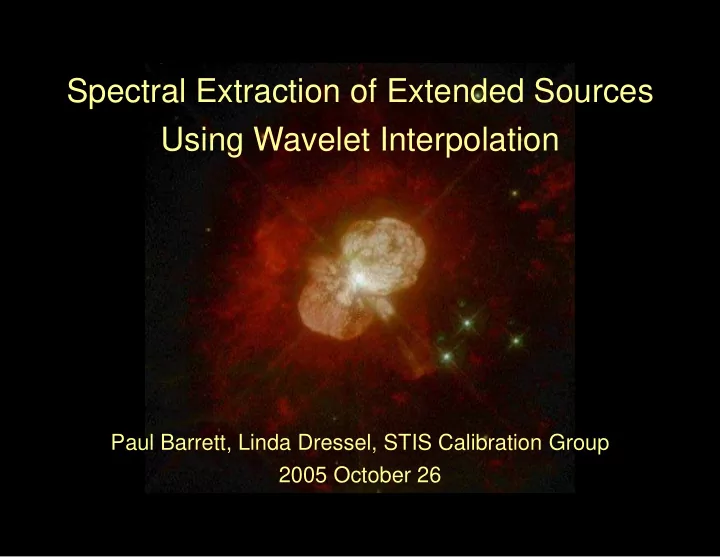

Spectral Extraction of Extended Sources Using Wavelet Interpolation Paul Barrett, Linda Dressel, STIS Calibration Group 2005 October 26
• STIS CCD Characteristics 1024 x 1024 pixels ~ 0.05 arcsecond square pixels PSF = 1/[1 + (x/a) 2 ] 2 where a ~ 1.3 pixels Default extraction width for spectra is 7 pixels • Problems with spectra of extended sources Lack of spatial resolution Source confusion Inaccurate fluxes
Raw spectral image of a point source showing pixel aliasing And extracted spectra for several pixel widths
An interpolated spectral image of a point source And extracted spectra for several pixel widths
Interpolating Subdivision • Construct a polynomial p of degree N (usually even): p(x k+n ) = y k+n for –N/2+1 < n ≤ N/2 • Calculate value at midpoint: y k+0.5 = p(x k+0.5 )
Average Interpolation Subdivision • Construct a polynomial p of degree N-1 (usually odd): ∫ p(x)dx = y k+n for –N/2+1 < n < N/2-1 where dx = [0, 1] • Calculate the values at k and k+0.5 • Note: the polynomial fits the cumulative values.
What are Wavelets? • A subfield of harmonic analysis • The Fourier transform Depends only on frequency – a global transform • The Short Time Fourier Transform (Gabor Transform) Depends on location and frequency – a local transform • Wavelets are local transforms with special properties Satisfy the refinement relation Compact support – are zero outside a specified range Low (scaling function) and high (wavelet) pass filters
Average Interpolation Algorithm 1. Subdivide pixel into 2 subpixels using an N-order (=7) polynomial to partition the counts in. 2. Apply inverse Haar transform (wavelet). 3. Repeat j times. 4. Convolve subpixels using instrumental PSF
Comparison of the Method
Recommend
More recommend